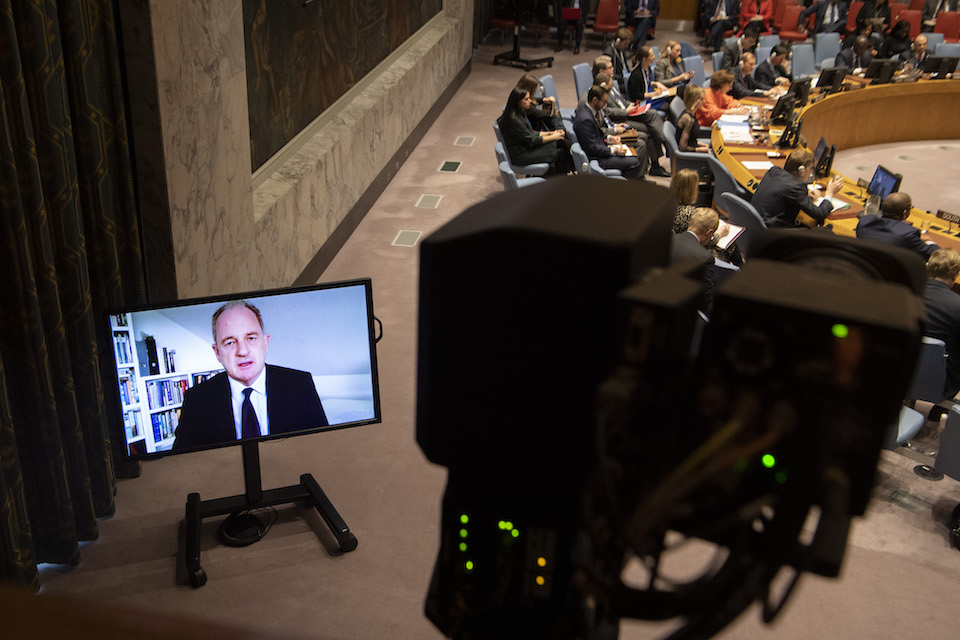Holding onto peace in South Sudan
Statement by Ambassador Jonathan Allen, UK Deputy Permanent Representative to the UN, at the Security Council briefing on South Sudan

Thank you very much, Madam President. And let me, like others, thank Special Representative Shearer for his briefing and not only that, but for his work and that of all his team out on the ground of South Sudan. We really enjoyed coming to see you, David. We were impressed by what you and your team were doing and we really want to thank you. And I’d also like to very much thank Ambassador Wronecka for her tireless efforts as the chair of the 2206 Sanctions Committee.
Madam President, this is our first Council meeting since the 100-day extension, but it’s not the first time that the parties have failed to deliver progress. We are over one third of the way through the 100-day extension. And I believe that this council must repeat and reinforce the clear and united message that we delivered collectively in Juba: that all parties must seize this opportunity and agree the steps that are necessary to form an inclusive government. And those steps include, of course, efforts to make progress on cantonment. And we heard from you today, SRSG Shearer, about the importance of resources being delivered into those cantonment sites, of food being delivered, of training being conducted and a genuine reintegration taking place to ensure security for all in South Sudan. I also very much want to pay tribute to those efforts of the Vice President of South Africa, David Mabuza, on the thorny question of states in South Sudan. It’s a crucial issue, one that we perhaps have to recognize that there may not be fully resolvable before the hundred days are over. But we do need commitment by the parties to continue to engage in that process and I very much welcome that, those efforts by the South African Vice President.
Of course, Madam President, we welcome the recent meetings and positive statements that have taken place between President Kiir and Dr Machar. But I have to say that so far we haven’t seen those shift the dial and I want to stress today the importance of actions and results, as well as statements and promises. And I echo the need expressed by others to resolve the status of Dr Riek Machar. I just do not understand how he does not hold a South Sudanese passport while he’s busy negotiating to be part of the South Sudanese government. And I hope that this can be sorted out quickly as a gesture of good faith and that his status can be resolved by the region.
Madam President, to achieve these ends, we strongly welcome the region’s engagement and leadership. History has shown that without external pressure, the parties fail to act and we therefore urge our partners in the region, particularly IGAD, to redouble efforts to ensure progress. We believe that the IGAD 50-day report will be an important moment. The Security Council must work hand-in-hand with IGAD, that is key, and I think we should consider in our consultations how we could deepen that cooperation. Madam President, we also need to look beyond the 100-day extension and issues around South Sudan’s future. It is deeply concerning that subnational communal violence remains at worrying levels across the country. And the persistence of conflict related sexual violence, as evidenced in the Secretary General’s report, is extremely worrying. All parties to the conflict must take immediate action to stop conflict related sexual violence. We welcome UNMISS’ focus on this important issue and its support for efforts to end impunity for such crimes. And I want to strongly support my Belgian colleagues intervention on this point and echo concerns over the re-appointment of the Gany County Commissioner. Humanitarian partners continue to face high levels of bureaucratic impediments to humanitarian access and serious insecurity and the urgency, as others have said, has only been further deteriorated by the recent flooding; the worst in 30 years with almost 1 million people affected. The UK’s contribution has been of 210 million dollars in 2018 and we continue to do all that we can to improve the situation.
Madam President, in closing, let me stress that the ongoing ceasefire must continue to hold and the two leaders must commit – must unequivocally commit to that ceasefire and to peace. This council must stand ready to support the parties in coordination with IGAD and the African Union to support the parties forward on the pathway to peace, to make necessary compromises. That cannot happen unless the best interests of the people of South Sudan are prioritised over the self-interest of the elite.
Madam President, there must be consequences for those who do not live up to their responsibilities to bring about a lasting peace in South Sudan. Thank you.